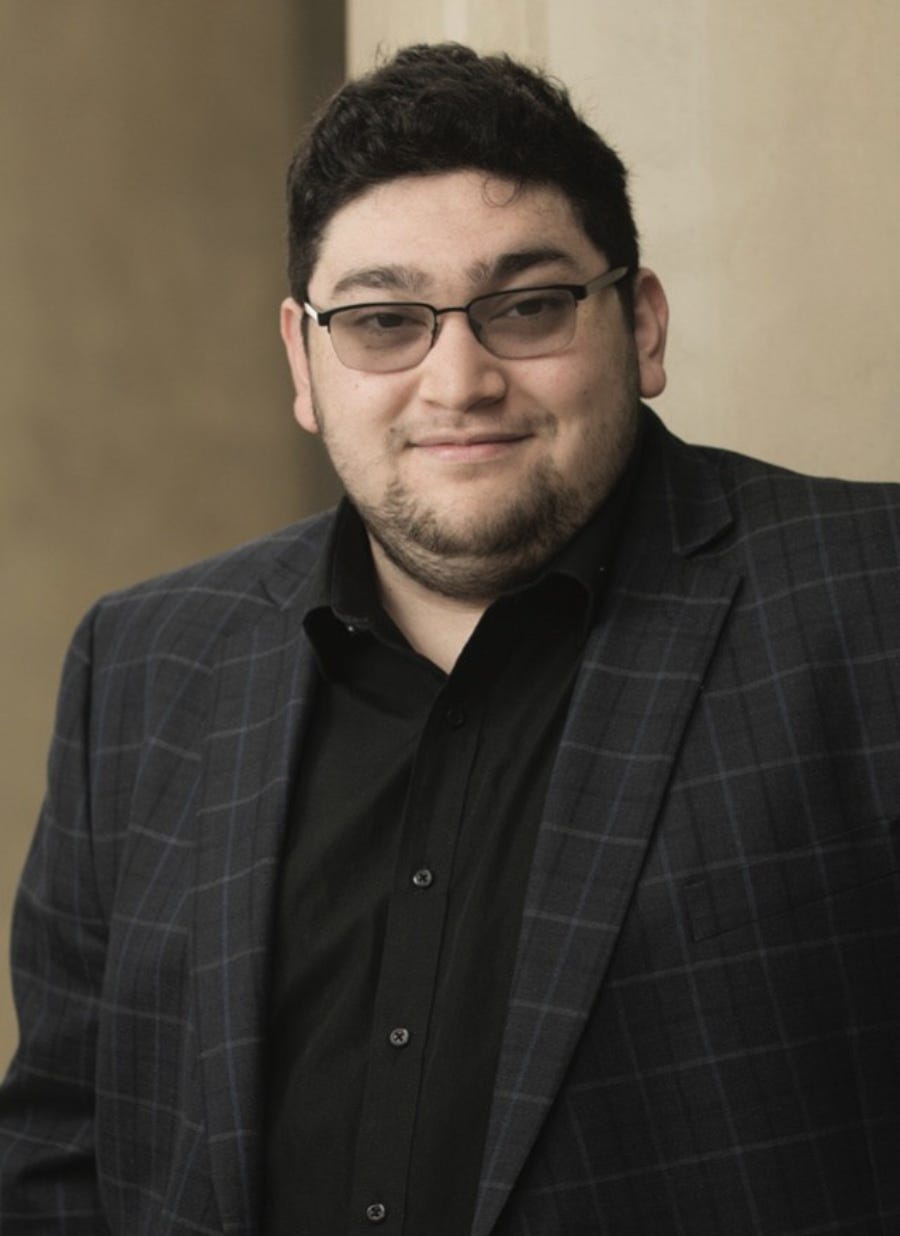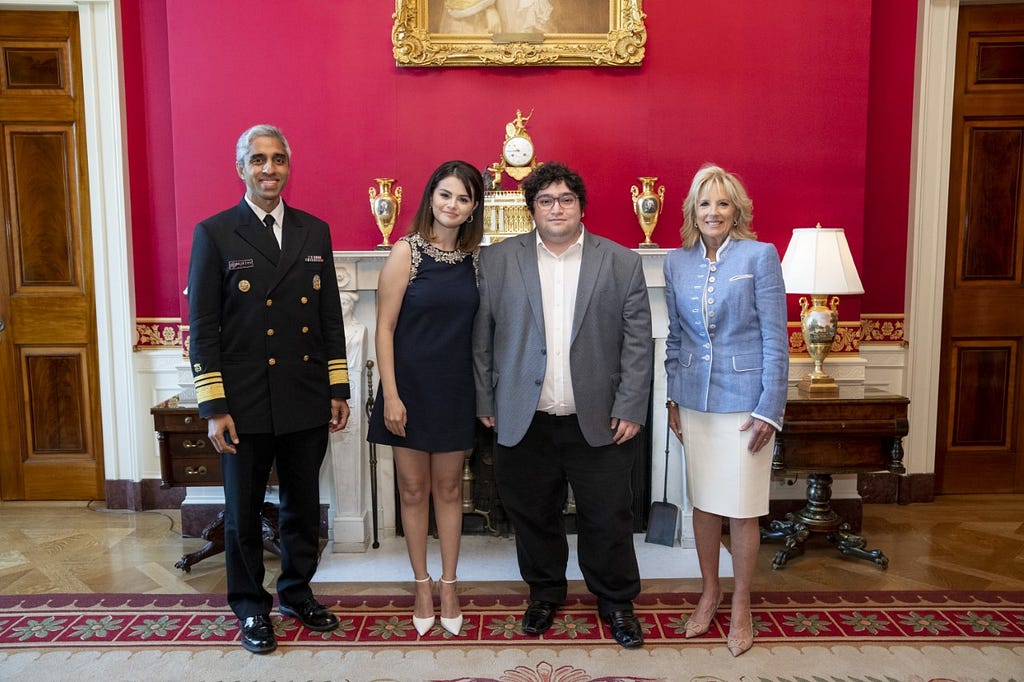Mental Health Champions: Why & How Zane Landin of PositiveVibes Magazine Is Helping To Champion Mental Wellness

Setting boundaries: This one is important for me to promote my wellbeing and mental wellness. Setting boundaries includes investing time in myself. If I am starting to feel mental exhaustion, I openly communicate with people about what I need and what they do to support me. Throughout the years, I have learned what I can handle.
As a part of our series about Mental Health Champions helping to promote mental wellness, I had the pleasure to interview Zane Landin.
Zane Landin is an authentic storyteller and public relations Imagineer. As a recent graduate from Cal Poly Pomona with a Bachelor of Science in Communication and Public Relations, he has a dedication to using stories’ power to drive cultural change. He is the founder of PositiveVibes Magazine, Landing Dreams PR, and serves on several boards that promote wellness, mental health, and positivity.
Thank you so much for doing this with us! Before we dig in, our readers would like to get to know you a bit. Can you tell us a bit about how you grew up?
I grew up in Chino, California, with the traditional nuclear family, with two parents, a sibling, and a housecat. I experienced mental health issues as a young child, but my family, especially my mother, was very supportive. Many families avoid seeking mental health care for their children, but my family knew how important it was.
You are currently leading a social impact organization that is helping to promote mental wellness. Can you tell us a bit about what you or your organization are trying to address?
I am the founder and CEO of PositiveVibes Magazine, a digital magazine designed to tell authentic stories about the mental health experience. Mental health impacts every person, and it is time we see those lived experiences reflected in the stories shared worldwide. The magazine mainly features optimistic advocates who have transformed their past experiences to inspire others. The fantastic voices we have amplified include traditional and alternative mental health treatment methods like medication, meditation, mediumship, trauma-healing, angel healing, sports, etc. One size does not fit all, especially in the mental health community, so we need to be responsible and tell diverse stories. Mental health is not a monolith.
Can you tell us the backstory about what inspired you to originally feel passionate about this cause?
I have always been surrounded by mental health all my life. Several family members, including myself, experience mental health conditions, so I always had a level of awareness. I saw a psychologist for years and learned how to handle my emotions better because I was a sensitive child. There is nothing wrong with being sensitive but learning how to address those emotions before they get out of hand is essential. University exposed me to the universe of advocacy. Before, I was only someone with a mental health background but never an advocate. I didn’t even think about pursuing something like that. There was also a huge stigma associated with people who had mental health conditions. I convinced myself I shouldn’t openly discuss mental health because it would make people uncomfortable. As I became more of an advocate, I learned that we need to talk about mental health openly to understand it better and become more aware.
Many of us have ideas, dreams, and passions, but never manifest them. They don’t get up and just do it. But you did. Was there an “Aha Moment” that made you decide that you were actually going to step up and do it? What was that final trigger?
I was a student at Cal Poly Pomona when the world was hit with COVID-19. During that time, I was taking a copyediting class for my degree requirement. For our final project, I created my digital publication. I decided to frame the assignment around mental health and positivity. I thought mental health was something people were experiencing across the board because of the dire effects of COVID-19 with the isolation.
The mainstream media had the opportunity to tell the stories of mental health during the pandemic. I was disappointed they failed to do so. Even today, there isn’t a massive push for mental health awareness. Once the media openly discusses mental health, the attention will drive awareness and change. We started the digital magazine in May 2020 with an Instagram account.
The vision of the magazine was to write about different mental health topics. That all changed around two months in when someone reached out with interest in sharing their story. I never thought we would feature people. Their interest changed the entire trajectory of the magazine. Our primary focus has been on featuring everyday people with inspiring stories. Everyone has a powerful story with a ravishing history. We want readers to take away from these people and apply it to their lives. It is all about advocating for transformational positivity.
Can you share the most interesting story that happened to you since you began leading your company or organization?
PositiveVibes Magazine empowered me to grow as a more compassionate entrepreneur and relationship-builder. By interviewing motivational leaders while working with talented writers from across the country, I am constantly challenging myself to become a more diligent and understanding advocate of and for the mental health community. Last year, I applied for the first-ever Mental Health Youth Action Forum by MTV and the White House. Thankfully, MTV selected me for the first class of 30 young advocates for this once-in-a-lifetime opportunity. It was a dream come true. If my younger self had told me I would be speaking about youth mental health at the White House, I never would have believed him. Without the digital magazine, I don’t think this program would have been possible for me. The forum was May 16–18. I had the chance to network with some of the most prominent leaders and mental health organizations. The most surprising aspect of the forum was meeting Selena Gomez, Dr. Biden, Dr. Murthy, and President Joe Biden.
None of us can be successful without some help along the way. Did you have mentors or cheerleaders who helped you to succeed? Can you tell us a story about their influence?
I have had many mentors who have shaped my journey and path. I wouldn’t be where I am without their support. My mother is the most outstanding mentor of all time, who showed me what true, radical love is. I don’t think you can be a mental health advocate without being kind and empathetic. There are many kind people, but my mom was the most understanding and positive soul I have ever met. She lit the candle in the darkness for many people. Unfortunately, in January of 2021, she passed away, so her guidance is even more needed. I remind myself of her legacy and continue to lead with her heart. Her love keeps me going.
According to Mental Health America’s report, over 44 million Americans have a mental health condition. Yet there’s still a stigma about mental illness. Can you share a few reasons you think this is so?
We. Are. Not. Talking. About. It. Millions of people experience mental health, but we aren’t discussing it as much as we should. We need to encourage people to share their stories, so others can be brave to share theirs. This will break barriers and increase awareness because it will become a part of everyday conversation. We need to tell the stories of regular people with mental health and perpetuate the notion that mental health is typical and experienced by millions of people. We all have mental health, but it doesn’t mean we all have mental health conditions. Clear distorted images of mental health are used in pop culture, especially in the horror genre. It is a typical experience at this point, and needs to be changed.
In your experience, what should a) individuals b) society, and c) the government do to better support people suffering from mental illness?
As individuals, we need to be aware of and understand mental illness to support the people in our lives. Reaching out and lending a compassionate ear can be the greatest gift for someone. There is nothing wrong with reaching out and asking someone how they can show up for them. Conversely, it may be challenging for the person to reach out for help so that you may be helping them in their time of need.
As a society, we need to talk more about mental health openly and willingly. The media needs to address this better and tell the stories of those with mental health conditions. Once the media begins proactively having these honest conversations in a true light, people will feel comfortable bringing it up in the different aspects of their lives. Once this happens, they will be more aware of the experiences of the mental health community, which is currently an issue because there are many stereotypes and misinformation. A common misconception about suicide is that talking about it will plant the idea in someone’s head. Studies show this isn’t the case and bringing it up will actually encourage them to seek medical attention.
I believe the government needs to do more for mental health by working with local communities to learn how actually to address their mental health needs. We need more mental health practitioners, especially ones of color because there are very few. We also need to provide more access to affordable mental health care because it can be challenging for someone to seek mental health care if they cannot afford it.

What are your 5 strategies you use to promote your own wellbeing and mental wellness? Can you please give a story or example for each?
- Setting boundaries: This one is important for me to promote my wellbeing and mental wellness. Setting boundaries includes investing time in myself. If I am starting to feel mental exhaustion, I openly communicate with people about what I need and what they do to support me. Throughout the years, I have learned what I can handle.
- Journaling: I love writing, so this one comes naturally to me. I try to journal regularly to maintain my emotions, allowing me to revisit how I felt in the past. Writing allows me to create a world I want to see in the future. It keeps me inspired and wanting more for the world.
- Meditating: This one allows me to come together with myself and achieve “stillness,” enabling me to reflect on everything. In such a fast-paced world, we must come to terms with ourselves in a place of peace and serenity to recognize who we are.
- Listening to music: Music is always something I will fall back on for anything — when I want to be alone, working on a quintessential project, or even when I want to daydream. It takes me back to when my mom was alive so it can be very nostalgic for me. Daydreaming helps me figure things out in the most creative way possible because nothing is impossible.
- Talking with my partner: I always talk to my partner about my feelings and experiences. It is beneficial, and I learn so much about myself as I engage in different conversations with him.
What are your favorite books, podcasts, or resources that inspire you to be a mental health champion?
I love the people I have worked with, like Helene Beck from Coming from the Heart Podcast, Sydney Weiss from Seek the Joy Podcast, Jarred Frey from the Bipolar Bachelor Podcast, and Sam Eaton. I also love the work of Dr. Nicole LePera, the Holistic Psychologist, and Dr. Monica P. Band, whom I met at the Mental Health Youth Action Forum. They both make unique, well-informed content on multicultural and social justice mental health topics. Some of the resources I appreciate are organizations like Active Minds, the Access and Disability Alliance at Cal Poly Pomona, and Sources of Strength that have given me the support and tools to be a mental health advocate.
If you could tell other people one thing about why they should consider making a positive impact on our environment or society, like you, what would you tell them?
I would ask people if they could live in a world without judgment or challenges and what that place would be. I would ask them why it couldn’t be possible for the world to be like that. If that is something they would like to see, what is stopping them from being a piece of the puzzle to make it possible?
How can our readers follow you online?
Please follow me on my personal Instagram and LinkedIn. Learn more about the magazine on our website and Instagram.
This was very meaningful, thank you so much. We wish you only continued success on your great work!
Mental Health Champions: Why & How Zane Landin of PositiveVibes Magazine Is Helping To Champion… was originally published in Authority Magazine on Medium, where people are continuing the conversation by highlighting and responding to this story.
